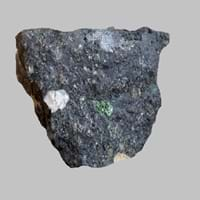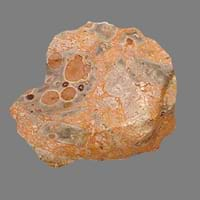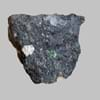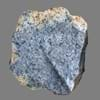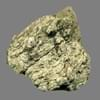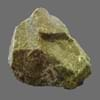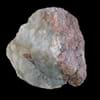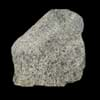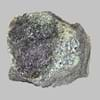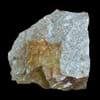Definition
Kimberlite is a rare, blue-tinged, coarse-grained intrusive igneous rock, which sometimes contains diamonds and is mostly found in South Africa and Siberia.
Felsite is a very fine grained volcanic rock that may or may not contain larger crystals and light colored rock that typically requires petrographic examination or chemical analysis for more precise definition
Origin
Kimberley, South Africa
Unknown
Discoverer
Unknown
Unknown
Etymology
From Kimberley + -ite, from the name of the South African town of Kimberley where the rock was first found.
From English feldspar and -ite
Class
Igneous Rocks
Igneous Rocks
Sub-Class
Durable Rock, Hard Rock
Durable Rock, Medium Hardness Rock
Other Categories
Coarse Grained Rock, Fine Grained Rock, Opaque Rock
Fine Grained Rock, Opaque Rock
Texture
Porphyritic
Arborescent Patterned, Vitreous
Color
Black, Bluish - Grey, Brown, Dark Greenish - Grey, Green, Grey
Black, Blue, Brown, Green, Orange, Red, Tan, Yellow
Durability
Durable
Durable
Scratch Resistant
Yes
Yes
Appearance
Dull and Banded
Layered, Banded, Veined and Shiny
Interior Uses
Countertops, Decorative Aggregates, Homes, Interior Decoration
Decorative Aggregates, Flooring, Interior Decoration
Exterior Uses
As Building Stone, Paving Stone, Garden Decoration
Paving Stone, Garden Decoration
Other Architectural Uses
Curbing
Curbing
Construction Industry
As a Flux in the Production of Steel and Pig Iron, As a Sintering Agent in Steel Industry to process Iron Ore, As Dimension Stone, Cement Manufacture, for Road Aggregate, Making natural cement, Manufacture of Magnesium and Dolomite Refractories
Arrowheads, Cutting Tool, Knives, Scrapers, Spear Points
Medical Industry
Taken as a Supplement for Calcium or Magnesium
Surgery
Antiquity Uses
Artifacts, Monuments, Sculpture, Small Figurines
Artifacts
Commercial Uses
An Oil and Gas Reservoir, As a Feed Additive for Livestock, Gemstone, Metallurgical Flux, Production of Lime, Soil Conditioner, Source of Magnesia (MgO)
Mirror, Jewelry
Types
Basaltic Kimberlites and Micaceous Kimberlites
Not Available
Features
Always found as volcanic pipes over deep continental crust, Host rock for Diamond, Is one of the oldest rock, Surfaces are often shiny
Available in Lots of Colors and Patterns, Clasts are smooth to touch, Splintery, Very fine grained rock
Archaeological Significance
Monuments
Used
Not Yet Used
Famous Monuments
Data Not Available
Not Applicable
Sculpture
Used
Not Yet Used
Famous Sculptures
Data Not Available
Not Applicable
Pictographs
Not Used
Used
Petroglyphs
Not Used
Used
Figurines
Used
Not Yet Used
Formation
Kimberlite is an igneous rock and is the main source of diamonds. Its formation takes place deep beneath the Earth’s surface between 150 to 450 kilometres, and are erupted rapidly and violently.
Felsite is a fine-grained, hard rock which is a type of metasomatite, essentially altered basalt. It forms with or without crystallization, either below the surface as intrusive rocks or on the surface as extrusive rocks.
Mineral Content
Garnet, Olivine, Phlogopite, Pyroxene
Feldspar, Iron Oxides
Compound Content
Aluminium Oxide, NaCl, CaO, Iron(III) Oxide, FeO, Potassium Oxide, MgO, MnO, Sodium Oxide, Silicon Dioxide, Titanium Dioxide
Aluminium Oxide, CaO, Iron(III) Oxide, FeO, Potassium Oxide, MgO, MnO, Sodium Oxide, Phosphorus Pentoxide, Silicon Dioxide, Titanium Dioxide
Types of Metamorphism
Burial Metamorphism, Cataclastic Metamorphism, Contact Metamorphism, Hydrothermal Metamorphism, Impact Metamorphism, Regional Metamorphism
Burial Metamorphism, Contact Metamorphism, Impact Metamorphism, Regional Metamorphism
Types of Weathering
Biological Weathering, Chemical Weathering, Mechanical Weathering
Biological Weathering, Chemical Weathering, Mechanical Weathering
Types of Erosion
Chemical Erosion, Coastal Erosion, Glacier Erosion, Sea Erosion, Water Erosion, Wind Erosion
Chemical Erosion, Glacier Erosion, Water Erosion
Grain Size
Fine to Coarse Grained
Fine Grained
Fracture
Conchoidal
Conchoidal
Porosity
Very Less Porous
Very Less Porous
Luster
Subvitreous to Dull
Vitreous
Compressive Strength
Not Available
Cleavage
Conchoidal
Non-Existent
Toughness
Not Available
Not Available
Specific Gravity
2.86-2.87
2.6-2.7
Transparency
Translucent to Opaque
Translucent
Density
2.95-2.96 g/cm3
2.6 g/cm3
Resistance
Heat Resistant, Impact Resistant
Heat Resistant, Impact Resistant
Deposits in Eastern Continents
Asia
Russia
Afghanistan, Indonesia, Japan, Russia
Africa
Angola, Botswana, Cameroon, Ethiopia, South Africa
Kenya
Europe
England, Hungary, Iceland, United Kingdom
Greece, Hungary, Iceland, Italy, Turkey
Others
Antarctica
Not Yet Found
Deposits in Western Continents
North America
Canada, USA
Canada, Mexico, USA
South America
Argentina, Colombia, Ecuador
Argentina, Chile, Ecuador, Peru
Deposits in Oceania Continent
Australia
New South Wales, New Zealand, South Australia, Western Australia
New Zealand
All about Kimberlite and Felsite Properties
Know all about Kimberlite and Felsite properties here. All properties of rocks are important as they define the type of rock and its application. Kimberlite and Felsite belong to Igneous Rocks.Texture of Kimberlite is Porphyritic whereas that of Felsite is Arborescent Patterned, Vitreous. Kimberlite appears Dull and Banded and Felsite appears Layered, Banded, Veined and Shiny. The luster of Kimberlite is subvitreous to dull while that of Felsite is vitreous. Kimberlite is available in black, bluish - grey, brown, dark greenish - grey, green, grey colors whereas Felsite is available in black, blue, brown, green, orange, red, tan, yellow colors. The commercial uses of Kimberlite are an oil and gas reservoir, as a feed additive for livestock, gemstone, metallurgical flux, production of lime, soil conditioner, source of magnesia (mgo) and that of Felsite are mirror, jewelry.
